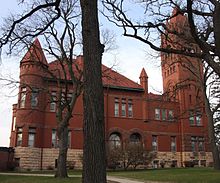Faribault County
| Faribault County, Minnesota | |
|---|---|

Faribault County Courthouse in Blue Earth
|
|
 Location in the U.S. state of Minnesota |
|
 Minnesota's location in the U.S. |
|
| Founded | February 20, 1855 |
| Named for | Jean Baptiste Faribault |
| Seat | Blue Earth |
| Largest city | Blue Earth |
| Area | |
| • Total | 722 sq mi (1,870 km2) |
| • Land | 712 sq mi (1,844 km2) |
| • Water | 9.4 sq mi (24 km2), 1.3% |
| Population (est.) | |
| • (2016) | 13,935 |
| • Density | 20/sq mi (8/km²) |
| Congressional district | 1st |
| Time zone | Central: UTC-6/-5 |
| Website | www |
Faribault County /ˈfeɪrɪboʊ/ is a county in the U.S. state of Minnesota. As of the 2010 census, the population was 14,553. Its county seat is Blue Earth. The county was founded in 1855. It is named for Jean-Baptiste Faribault, a settler and French fur trader among the Sioux Indians.
According to the U.S. Census Bureau, the county has an area of 722 square miles (1,870 km2), of which 712 square miles (1,840 km2) is land and 9.4 square miles (24 km2) (1.3%) is water.
As of the 2000 census, there were 16,181 people, 6,652 households, and 4,476 families residing in the county. The population density was 23 people per square mile (9/km²). There were 7,247 housing units at an average density of 10 per square mile (4/km²). The racial makeup of the county was 97.11% White, 0.24% Black or African American, 0.19% Native American, 0.36% Asian, 0.04% Pacific Islander, 1.36% from other races, and 0.69% from two or more races. 3.50% of the population were Hispanic or Latino of any race. 45.5% were of German, 21.2% Norwegian and 5.1% Irish ancestry.
...
Wikipedia
